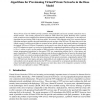Free Online Productivity Tools
i2Speak
i2Symbol
i2OCR
iTex2Img
iWeb2Print
iWeb2Shot
i2Type
iPdf2Split
iPdf2Merge
i2Bopomofo
i2Arabic
i2Style
i2Image
i2PDF
iLatex2Rtf
Sci2ools
TON
2002
2002
Algorithms for provisioning virtual private networks in the hose model
Virtual Private Networks (VPNs) provide customers with predictable and secure network connections over a shared network. The recently proposed hose model for VPNs allows for greater flexibility since it permits traffic to and from a hose endpoint to be arbitrarily distributedto other endpoints. In this paper, we develop novel algorithms for provisioning VPNs in the hose model. We connect VPN endpoints using a tree structure and our algorithms attempt to optimize the total bandwidth reserved on edges of the VPN tree. We show that even for the simple scenario in which network links are assumed to have infinite capacity, the general problem of computing the optimal VPN tree is NP-hard. Fortunately, for the special case when the ingress and egress bandwidths for each VPN endpoint are equal, we can devise an algorithm for computing the optimal tree whose time complexity is O(mn), where m and n are the number of links and nodes in the network, respectively. We present a novel integer progra...
Algorithms | TON 2002 | VPN Endpoints | Vpn Trees |
| Added | 23 Dec 2010 |
| Updated | 23 Dec 2010 |
| Type | Journal |
| Year | 2002 |
| Where | TON |
| Authors | Amit Kumar, Rajeev Rastogi, Abraham Silberschatz, Bülent Yener |
Comments (0)

